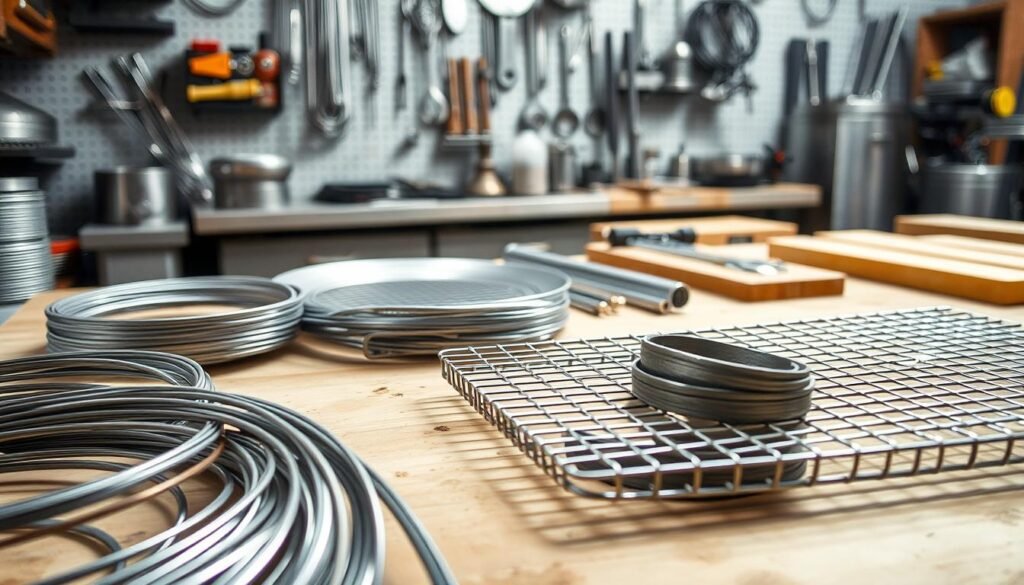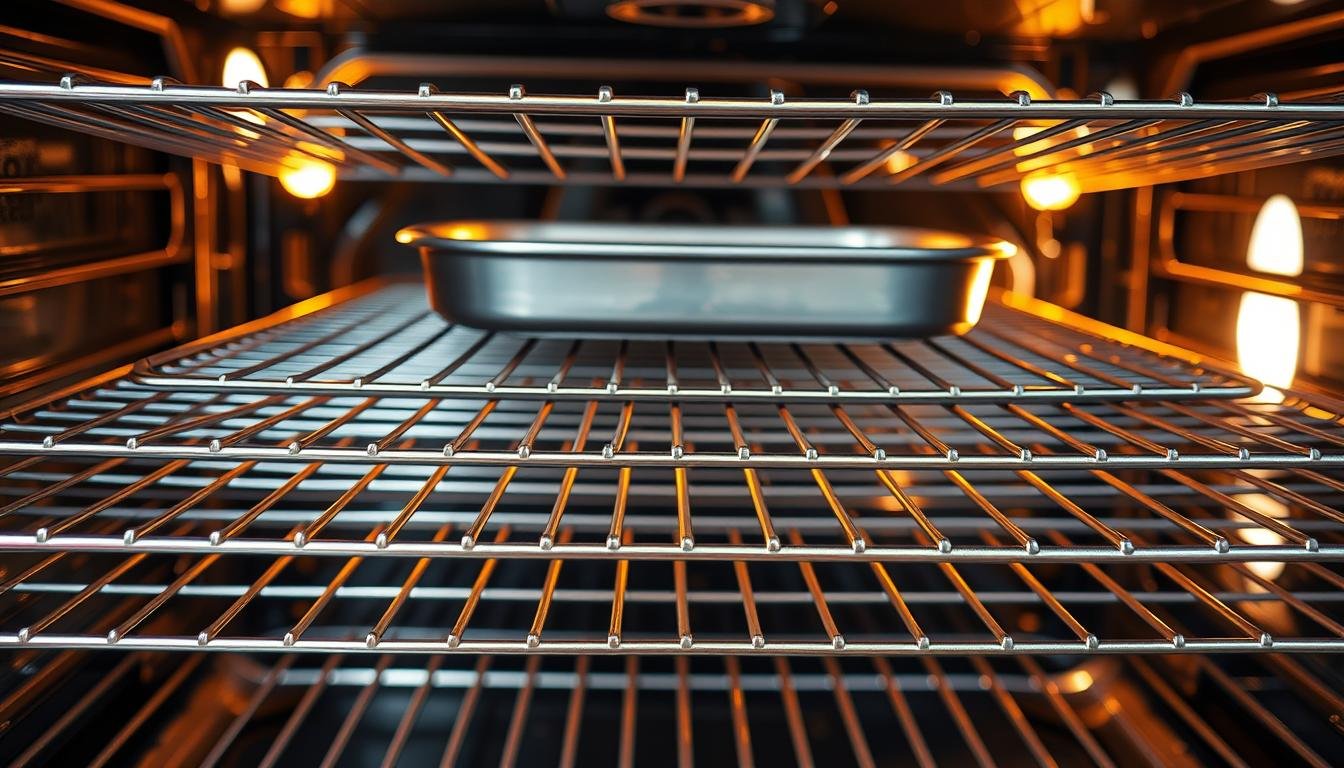Last updated on August 15th, 2025 at 08:25 am
Baking with Iron Wire: Baking is a precise science that needs the right tools and techniques. Many bakers wonder if iron wire is safe for the oven.
Iron wire can be handy for shaping baked goods. But, its safety at high oven temperatures is a concern.
Can iron wire handle oven heat safely? Knowing the safety of baking with iron wire is key for a successful bake.
Contents
- 1 Understanding Iron Wire and Its Properties
- 2 Can You Put Iron Wire in the Oven?
- 3 Risks and Hazards of Using Iron Wire for Baking
- 4 How to Identify Oven-Safe Wire Materials
- 5 Safe Alternatives to Iron Wire for Baking Projects
- 6 Safe Baking with the Right Materials
- 7 FAQ: Baking with Iron Wire
- 7.1 Is iron wire safe to use in the oven?
- 7.2 What are the risks of using iron wire in baking?
- 7.3 How can I identify oven-safe wire materials?
- 7.4 What are some safe alternatives to iron wire for baking projects?
- 7.5 Can I use any type of wire for baking?
- 7.6 What happens if I put iron wire in the oven?
Understanding Iron Wire and Its Properties
To know if iron wire is safe for the oven, we must look at its makeup and traits. Iron wire is crafted from iron, a metal celebrated for its toughness and lasting power. Yet, its qualities might impact its fit for baking.
Iron wire is mostly iron, with some carbon and other elements mixed in. Its melting point is about 1538°C (2800°F), quite high. Yet, iron can start to rust when it meets high heat and oxygen.
- High melting point
- Good tensile strength
- Reactivity with oxygen at high temperatures
- Potential for rust if not properly coated or treated
It’s key to grasp these traits when thinking about iron wire for baking. Its high melting point might seem like a plus for oven use. But, its tendency to rust and react with oxygen are big concerns.
Also, the type of iron wire matters. Some are coated or treated to fight off corrosion. Knowing the exact type and its treatment can guide you on its safety for baking.
Key Considerations for Iron Wire in Baking
| Property | Description | Impact on Baking |
|---|---|---|
| Melting Point | High (around 1538°C) | Generally safe for oven temperatures |
| Reactivity | Reacts with oxygen at high temperatures | Potential for oxidation or rust |
| Tensile Strength | Good | Can withstand mechanical stress |
Can You Put Iron Wire in the Oven?
Before you put iron wire in the oven, know the risks. Iron wire is used in DIY projects and baking. But, its safety in the oven is a big concern.
Iron wire can react at high temperatures. Its melting point is over 2,800°F (1,538°C), much higher than oven temperatures. But, it can still rust or oxidize, especially if it’s not coated or if it’s humid.
Rust from iron wire can contaminate food. It’s not harmful in small amounts but can still be a problem. Also, iron wire can warp or bend in the oven, causing uneven heating or damage.
To safely use iron wire in the oven, make sure it’s clean and free of harmful coatings. Also, secure the wire well to avoid hazards. If unsure, choose materials made for oven use instead.
In short, iron wire can be used in the oven but with caution. Be aware of oxidation, secure the wire well, and consider the oven’s safety. If unsure, it’s best to use materials made for oven use.
Risks and Hazards of Using Iron Wire for Baking
Using iron wire in baking can harm your oven. It can affect many parts of your oven.
Effects on Heating Elements
Iron wire can mess with your oven’s heating elements. When heated, it might damage the elements or change how they work. This can cause your baked goods to cook unevenly.
Uneven heating can ruin your baking and make your oven use more energy. It works harder to get the right temperature.
Impacts on Oven Linings
The oven lining is also at risk with iron wire. The wire can scratch or damage it, making it a place for bacteria to grow. If the lining is damaged, harmful substances can get into your food.
A damaged lining also makes cleaning hard. Food and debris can get stuck in the scratches or damaged areas. This makes your oven a place for bacteria to thrive.
| Material | Effect on Heating Elements | Impact on Oven Linings |
|---|---|---|
| Iron Wire | Potential damage, uneven heating | Scratches, damage, bacterial growth |
| Oven-Safe Wire | No significant impact | No damage, easy to clean |
Knowing these risks helps you decide if iron wire is right for baking. It’s important to think about the dangers. You might want to choose safer materials for your oven.
How to Identify Oven-Safe Wire Materials
To keep your kitchen safe, it’s key to know which wires can handle oven heat. Oven-safe wires are made to stay strong at high temperatures without harming you. When picking wire for baking, look at the metal type.
Wires from stainless steel or heat-resistant alloys are good for the oven. They don’t warp or melt easily. But, avoid wires that melt quickly or have non-heat-resistant coatings.

To see if a wire is safe for the oven, check the maker’s details or look for heat-resistant signs. You can also check the wire’s build and what it’s made of. Always err on the side of caution when unsure.
Here are some tips for finding oven-safe wire materials:
- Check the product description or manufacturer’s guidelines.
- Look for certifications or compliance with safety standards.
- Inspect the wire for any signs of damage or wear.
By following these tips, you can make sure your baking is safe and works well. The right materials are key to safe baking.
Safe Alternatives to Iron Wire for Baking Projects
You don’t have to stick with iron wire for baking. There are other materials that are safe and reliable. The materials you choose can greatly affect your baking’s success and safety.
Stainless steel wire is a safe alternative. It’s strong and can handle high temperatures well. It also doesn’t corrode, making it perfect for moist projects.
Nickel wire is another oven-safe option. It’s used in professional baking for its heat conductivity and durability. But, nickel can be pricier, so consider your needs and budget.
Copper wire is known for its heat conductivity. It’s not as strong as stainless steel but great for even heating. But, copper can react with some ingredients, so use it carefully.
Think about using wire coatings or silicone-coated wires. They’re safe for high oven temperatures and easy to clean. They also protect against direct food contact.
When picking a wire alternative, think about your project’s needs. Consider the temperature, food type, and durability needed. The right material ensures a safe and successful bake.
Safe Baking with the Right Materials
When baking with wire, safety is key. Iron wire isn’t always safe for the oven because of risks. It’s important to pick materials made for high heat.
Iron wire might work sometimes, but it’s not always safe. Better options include stainless steel or wires coated for heat. These are safer and more reliable for baking.
Choosing the right materials and following safe practices helps avoid risks. Always check the wire’s specs and recommendations before baking.
See Also: Can an Electric Oven Be Used to Heat Food?
FAQ: Baking with Iron Wire
Is iron wire safe to use in the oven?
Iron wire is not safe for the oven. It can harm the oven or make cooking unsafe because of its properties.
What are the risks of using iron wire in baking?
Iron wire can damage your oven’s heating elements. It can also harm the oven lining. And, it might cause chemical reactions that could be dangerous.
How can I identify oven-safe wire materials?
Look for wires made from stainless steel or nichrome. These materials have high melting points and resist corrosion. They’re good for high-temperature use.
What are some safe alternatives to iron wire for baking projects?
Safe options include stainless steel wire and nichrome wire. These are made for oven use and can handle high temperatures safely.
Can I use any type of wire for baking?
No, not all wires are safe for baking. Only use wires that are specifically made for oven use to avoid risks.
What happens if I put iron wire in the oven?
Iron wire can react with other elements in the oven. This can damage the oven, the wire, or make cooking unsafe.

Hi, I’m Leland Benson from Los Angeles. I studied marketing and worked 5 years at LG, selling ovens. From my job, I learned what things are safe to put in ovens. Now, I share simple advice to help you cook safely.

